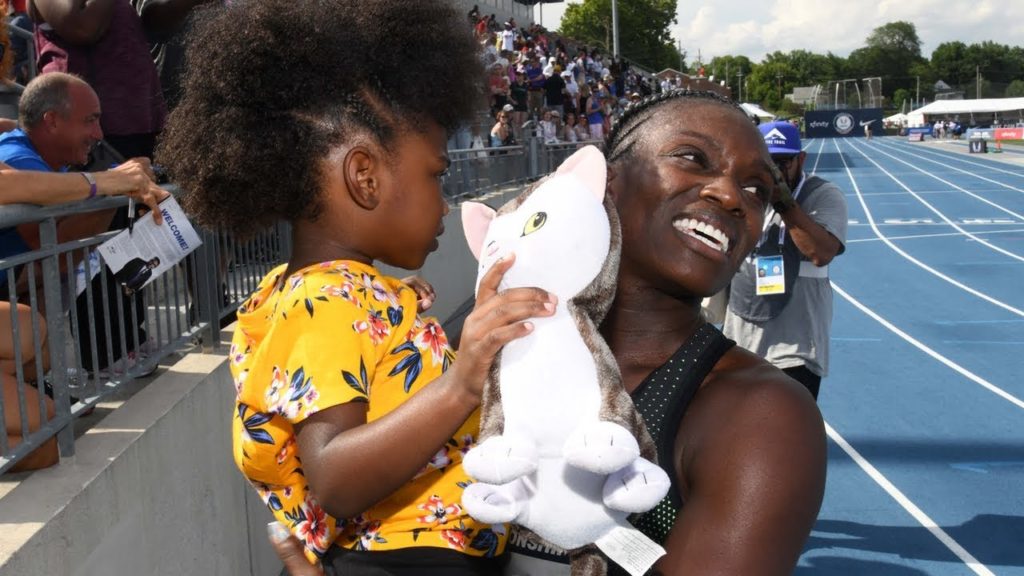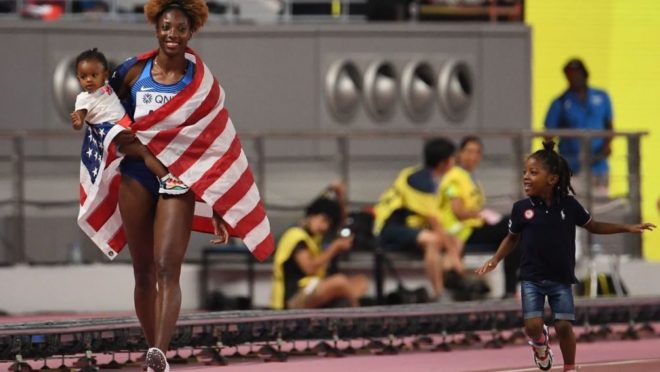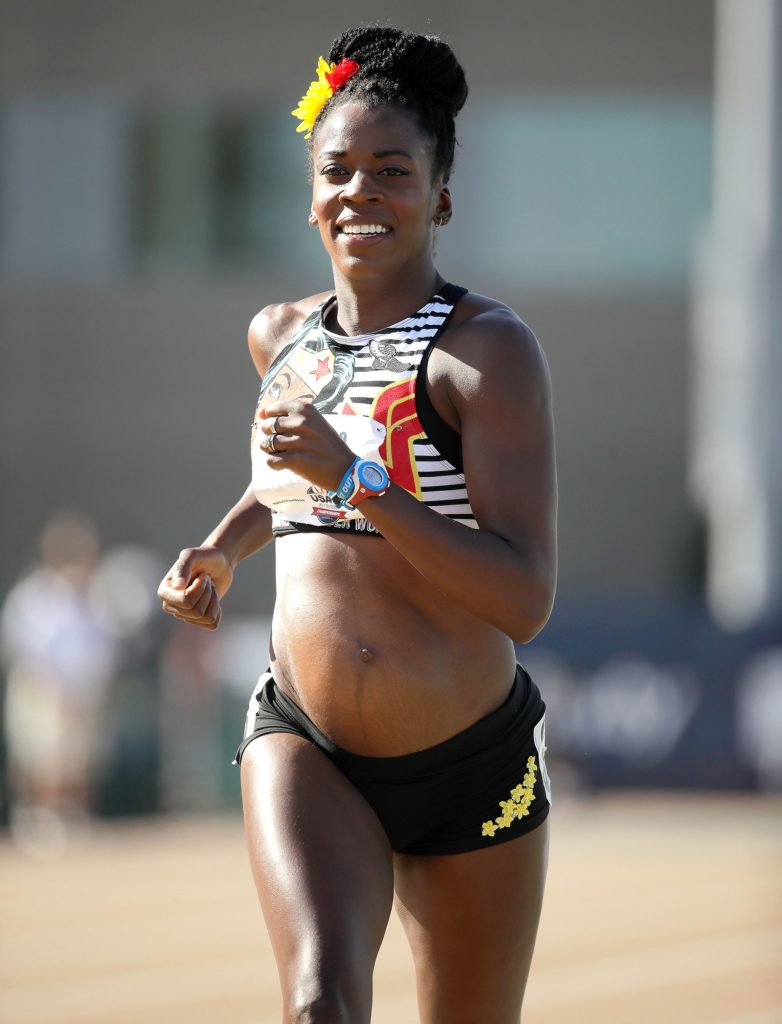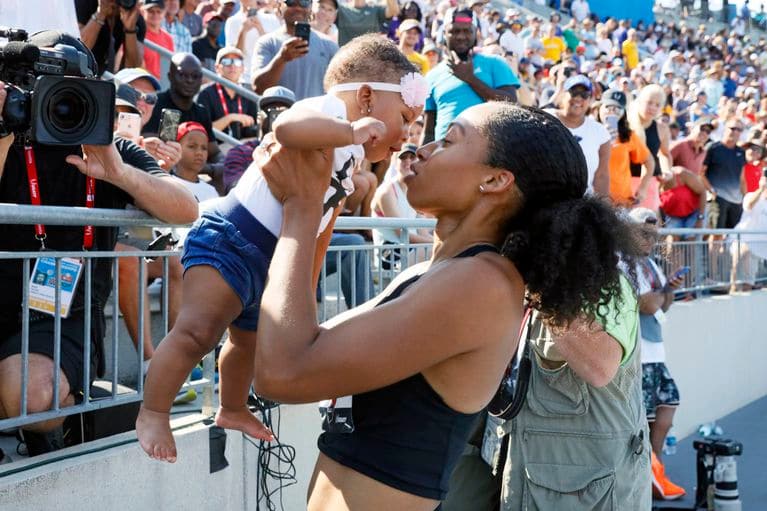Guess Who’s Back
by Savannah Cress
In September 2018, Dawn Harper Nelson, faced with the astonishingly common dilemma of needing to choose between her career or parenting, announced her retirement from professional hurdling in favor of starting a family. A little over a year later, the 35-year-old athlete officially retracted that decision with the acknowledgment that she was not finished yet and was training for Tokyo. [1] [2]
[am4show not_have=’g5;’]
[/am4show][am4guest]
[/am4guest][am4show have=’g5;’]
While digging for information for this story, I couldn’t help but notice the masses of mom-focused, sometimes-cheesy, headlines that inundated the search results list: “Mamma Nia!” [4] and “Nia Ali, mother of two, wins 100m hurdles…” [3] and “Mommy Track: Hurdler Dawn Harper Nelson Comes out of Retirement for 2020 Olympic Push.” [5] Olympic “Push?” Really..? It seems like if a female athlete starts a family during her career, the media focus shifts dramatically. I suppose that’s to be expected for anything “out of the normal,” and historically, pro athletes generally tended to do as Harper Nelson originally did: “retire” before starting a family. Further investigation into the subject brought it to my attention that a lot of athletes who do retire and then have children likely go that route due to the lack of precedence, and therefore lack of systems in place to financially allow them any other choice.
Many career-driven women are faced with unspoken job risks once becoming mothers. You hear stories of talented, “successful” women who have worked their way up the corporate ladder in their field, taken the minimum maternity leave, return to work with no less drive, possibly more motivation, and subsequently are passed over for promotions. Their previous responsibilities are passed off to coworkers, and they find themselves stuck in a category, deemed “less reliable” due to their new responsibilities as a parent. The 1993 Family and Medical Leave act requires 12 weeks of maternity leave, alleviating the concern of fully losing one’s job, if the company has 50 or more employees. The leave does not have to be paid. So as long as you are employed by a large company, have the financial security to survive 12 weeks without pay, and assuming you can afford full-time child care for your 3-month old baby in order to return to work a full month before the 16-week minimum that is recommended by the World Health Organization, you should be good to go. [6] The reality is, many workers do not fall in that category, and with only 17% of civilian workers in the United States having access to paid family leave, that makes pregnancy a somewhat concerning event for a lot of people. [7]
Professional athletes are no exception. Until recently, when athletes such as Harper Nelson, Allyson Felix and Alysia Montano brought the matter of combining motherhood with professional athletics to the forefront, I had not even thought about the complications added to a pregnancy when one’s pay is directly related to one’s performance in a race, and sponsors are not required to follow FMLA guidelines. So I don’t find it hard to understand why the beaten path has been “fulfill your athletic career, then start a family.” That doesn’t make the lack of other options acceptable. There are several professional female athletes who have decided to take a stand in this matter and, non-disclosure agreements be damned, fight for their right to become mothers while holding down a job to return to after their child’s birthday.
When Harper Nelson announced her retirement, she stated that she had always wanted to win an Olympic gold medal, get married, and be a mother. “Right now, I am two for three, and I’m feeling the urge to be someone’s mom,” she told Reuters in an interview. [2] During the year in which she was retired on paper, Harper Nelson stayed on the track, even continuing to walk over hurdles into her 7th month of pregnancy. [5] She couldn’t shake the feeling inside of her suggesting it wasn’t really over. “The whole time, I didn’t know in my heart if I was done” she admitted. [2] At some point, she cane upon the realization that she shouldn’t have to choose between motherhood and running, and that she should be free to do both. In fact, her daughter was a huge part of her decision to come out of retirement. The thought of her daughter one day feeling like she was the reason her mom had to set aside her dreams on the track was not a thought that Harper Nelson wanted to give the chance of becoming reality. With a great support system in place, Harper Nelson made the decision to continue chasing her dreams. Her immediate plan is to start with indoor meets and work her way back into the outdoor season, with an ultimate goal of competing in Tokyo in 2020. [2]
Harper Nelson has plenty of inspiration from athletes who have made comebacks after taking the necessary time to have children. After the 2014 season, when Nia Ali unexpectedly became pregnant, she quickly developed a positive outlook and accepted that timewise, she would miss out on the 2015 World Championships. She shifted her focus to defending her indoor title and making the 2016 Olympic team. She continued intensive training, with slight modifications, into her fifth month of pregnancy, at which point she backed off and focused on maintaining fitness while embracing the changes that were happening in her body. Six weeks after the May 8th birth of her son, Titus Maximum Tinsley (yes, as in US 400m hurdler, Michael Tinsley), Ali began building her endurance back up with some longer runs. By the end of the summer, she returned to LA and fully immersed herself in training for her first season back. In that first season back after becoming a mother, Ali successfully defended her title, taking the gold medal in the 2016 Indoor World Championships. She subsequently placed third in the 2016 Olympic trials, went on to represent the USA in the Rio Olympics where she brought home the silver 100h medal. [10] [11]
In June of 2018, Ali gave birth to her 2nd child, a daughter,Yuri. Upon returning to the track this time, Ali experienced many successes, including her recent gold at the IAAF world championships in DOHA. This championship was won with a personal-best time of 12.34. This put Ali on the list as the 9th best-performing 100m hurdler of all time, tied with Sharika Nelvis. [11] [16]
As mentioned earlier, Allyson Felix and Alysia Montano are also major names in the movement toward maternity protection for athletes.
Montano has won six US 800m championship titles. She kept training and competing through each of her pregnancies. She ran in the 2014 US Track and Field Championship while 8 months pregnant, drawing a lot of media attention. She came back in 2015, after having given birth, and won the 800m final, qualifying for the 2015 World Athletics Championships in Beijing. [11]
Frustrated with the system, after putting her body through potentially-harmful activity in order to keep within Nike’s contracted injury timeline after giving birth, Montano broke her confidentiality clause and created a video called “Maternity Leave for Athletes? Just Do It.” This video highlights her experience with attempting to negotiate her contract with sponsors after becoming pregnant. Montano also is actively advocating for maternity leave legislation to try and get policies formally in place to protect athletes who chose to have children before their careers are over. [13] [14]
Felix, eleven-time world champion, got pregnant in 2017. Her pregnancy did not go smoothly. Felix found herself in the hospital after what she thought was a routine 32 week check up. She gave birth to her daughter days later, and, between the two of them, recovery in the hospital lasted another month, and even longer once discharged. When she spoke with her sponsor, Nike, about contract renewal, she was mortified when the company offered her a 70% pay reduction from what she had been making before she had a baby. Felix left Nike, and signed with Athleta before competing on the women’s relay team at the 2019 world championships. Empowered by Montano’s openness about pregnancy as a pro athlete, Felix chose to speak out on the topic as well. “It’s just such a pivotal time right now in women’s sports, and we’re seeing change happen,” Felix told the Associated Press. [15]
Change is happening. Due largely in part to athletes from an array of different sports bringing the issue to public attention, some sponsors are revising their contracts. They are adding in amendments that allow athletes a little more time to get their newborn children off to a solid start before stressing about training at the level needed to live up to the performance requirements of their contracts. In the words of Ali after preliminary rounds in DOHA, “Just because you’re a mom doesn’t mean that you can’t get out there and continue to be an athlete as well, a top, world-class athlete.”
I’m going to have to agree with her. I mean, if going through the journey of carrying another human being inside of you, nourishing it while it completes development, and then physically pushing it out of your body doesn’t make somebody stronger, I’m not sure what does. [15]
[3] https://olympics.nbcsports.com/2019/10/06/nia-ali-track-and-field-world-championships/
[6]https://en.wikipedia.org/wiki/Maternity_leave_in_the_United_States
[7] https://www.bls.gov/opub/ted/2019/access-to-paid-and-unpaid-family-leave-in-2018.htm
[8] https://www.runnersworld.com/news/a27750194/pregnancy-pro-runners-contracts/
[9]https://www.flotrack.org/articles/6193645-dawn-harper-nelson-to-retire-after-2018-season
[10]https://spikes.worldathletics.org/post/nia-alis-extra-edge
[11] https://en.wikipedia.org/wiki/Nia_Ali
[12] https://en.wikipedia.org/wiki/Alysia_Monta%C3%B1o
[13] https://www.nytimes.com/2019/05/12/opinion/nike-maternity-leave.html
[15] https://apnews.com/c058ad5f16f1484bb18d298530ee3f83
[16] https://www.yahoo.com/lifestyle/nia-ali-takes-victory-lap-with-children-214027885.html
[/am4show]




